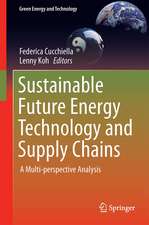Climate Change Mitigation: A Balanced Approach to Climate Change: Lecture Notes in Energy, cartea 4
Editat de Mitsutsune Yamaguchien Limba Engleză Paperback – 17 iul 2014
“For 20 years, diplomats have struggled to make progress on climate change, mostly because global diplomacy is not well-linked to the realities of how nations and firms control emissions and adapt to the impacts of a changing climate. In this excellent book, Dr Yamaguchi has assembled experts to guide the redesign of global policy. The authors underscore how global warming efforts must resonate with other policy goals.” David G. Victor, Director, Laboratory on International Law and Regulation and Professor, University of California San Diego
“Climate Change Mitigation clarifies that climate change cannot be controlled by sacrificing economic growth or other global problems; however, action to control climate change cannot be delayed.Climate policy is pervasive and affects all dimensions of international policy;but it cannot be too ambitious: a balanced approach between mitigation and adaptation, economic growth and resource management, and short term development and long term investments, should be adopted. I recommend its reading.” Carlo Carraro,President, Ca’ Foscari University of Venice
“The International Energy Agency estimates for every $1 of investment now toward sustainable energy, $4 of future spending can be saved. There is a business case for companies to reduce energy use. Companies in the energy and resource intensive industries must lead the way.” Chad Holliday, Chairman. World Business Councilfor Sustainable Development and former Chair and CEO, DuPont
| Toate formatele și edițiile | Preț | Express |
|---|---|---|
| Paperback (1) | 639.73 lei 6-8 săpt. | |
| SPRINGER LONDON – 17 iul 2014 | 639.73 lei 6-8 săpt. | |
| Hardback (1) | 644.18 lei 6-8 săpt. | |
| SPRINGER LONDON – 28 iun 2012 | 644.18 lei 6-8 săpt. |
Din seria Lecture Notes in Energy
-
 Preț: 436.35 lei
Preț: 436.35 lei - 15%
 Preț: 655.60 lei
Preț: 655.60 lei - 18%
 Preț: 952.09 lei
Preț: 952.09 lei - 18%
 Preț: 1012.84 lei
Preț: 1012.84 lei - 15%
 Preț: 635.80 lei
Preț: 635.80 lei - 15%
 Preț: 645.96 lei
Preț: 645.96 lei - 15%
 Preț: 645.47 lei
Preț: 645.47 lei - 15%
 Preț: 640.06 lei
Preț: 640.06 lei - 15%
 Preț: 649.71 lei
Preț: 649.71 lei - 15%
 Preț: 643.84 lei
Preț: 643.84 lei - 18%
 Preț: 954.31 lei
Preț: 954.31 lei - 15%
 Preț: 643.84 lei
Preț: 643.84 lei - 18%
 Preț: 949.73 lei
Preț: 949.73 lei - 18%
 Preț: 1411.69 lei
Preț: 1411.69 lei - 15%
 Preț: 634.18 lei
Preț: 634.18 lei - 15%
 Preț: 649.87 lei
Preț: 649.87 lei - 15%
 Preț: 642.03 lei
Preț: 642.03 lei - 18%
 Preț: 957.62 lei
Preț: 957.62 lei - 15%
 Preț: 652.49 lei
Preț: 652.49 lei - 18%
 Preț: 963.15 lei
Preț: 963.15 lei -
 Preț: 361.03 lei
Preț: 361.03 lei -
 Preț: 391.79 lei
Preț: 391.79 lei - 15%
 Preț: 646.11 lei
Preț: 646.11 lei -
 Preț: 394.29 lei
Preț: 394.29 lei -
 Preț: 391.22 lei
Preț: 391.22 lei - 18%
 Preț: 954.45 lei
Preț: 954.45 lei - 18%
 Preț: 957.62 lei
Preț: 957.62 lei - 15%
 Preț: 647.27 lei
Preț: 647.27 lei - 18%
 Preț: 960.30 lei
Preț: 960.30 lei - 18%
 Preț: 1250.74 lei
Preț: 1250.74 lei - 15%
 Preț: 642.18 lei
Preț: 642.18 lei - 15%
 Preț: 639.41 lei
Preț: 639.41 lei -
 Preț: 488.71 lei
Preț: 488.71 lei - 18%
 Preț: 1677.21 lei
Preț: 1677.21 lei
Preț: 639.73 lei
Preț vechi: 752.63 lei
-15% Nou
Puncte Express: 960
Preț estimativ în valută:
122.43€ • 127.34$ • 101.07£
122.43€ • 127.34$ • 101.07£
Carte tipărită la comandă
Livrare economică 14-28 aprilie
Preluare comenzi: 021 569.72.76
Specificații
ISBN-13: 9781447159278
ISBN-10: 1447159276
Pagini: 284
Ilustrații: XX, 264 p.
Dimensiuni: 155 x 235 x 15 mm
Greutate: 0.4 kg
Ediția:2012
Editura: SPRINGER LONDON
Colecția Springer
Seria Lecture Notes in Energy
Locul publicării:London, United Kingdom
ISBN-10: 1447159276
Pagini: 284
Ilustrații: XX, 264 p.
Dimensiuni: 155 x 235 x 15 mm
Greutate: 0.4 kg
Ediția:2012
Editura: SPRINGER LONDON
Colecția Springer
Seria Lecture Notes in Energy
Locul publicării:London, United Kingdom
Public țintă
ResearchCuprins
Introduction.- The ultimate objective of climate response strategies, and a desirable and feasible international framework.- Mitigation targets and effort-sharing among regions and countries.- Balance between energy security and mitigation responses.- Cost of mitigation.- Balance between mitigation and adaptation.- Policies and measures.- Potential for energy efficiency improvement and barriers.- Technology diffusion and development.- Nuclear Accident at the Fukushima Daiichi Nuclear Power Plant, and its impact on Japanese energy and climate policy.- Epilogue, IPCC and communication
Notă biografică
Mitsutsune Yamaguchi is an environmental economist and Project Professor at the University of Tokyo. He is a member of several committees on climate change of the Government, Vice Chair of the Joint Working Party on Trade and Environment, Organization for Economic Co-operation and Development (OECD), and a lead author of Working Group III of the Intergovernmental Panel on Climate Change (IPCC) for the 3rd, 4th and 5th assessment reports.
Textul de pe ultima copertă
This book provides a fresh and innovative perspective on climate change policy. By emphasizing the multiple facets of climate policy, from mitigation to adaptation, from technological innovation and diffusion to governance issues, it contains a comprehensive overview of the economic and policy dimensions of the climate problem. The keyword of the book is balance. The book clarifies that climate change cannot be controlled by sacrificing economic growth and many other urgent global issues. At the same time, action to control climate change cannot be delayed, even though gradually implemented. Therefore, on the one hand climate policy becomes pervasive and affects all dimensions of international policy. On the other hand, climate policy cannot be too ambitious: a balanced approach between mitigation and adaptation, between economic growth and resource management, between short term development efforts and long term innovation investments, should be adopted. I recommend its reading.
Carlo Carraro, President, Ca’ Foscari University of Venice
For Twenty Years diplomats have struggled to make progress on the problem of global climate change. Some of their difficulties stem from the fact that global diplomacy is not well-enough linked to the realities of how real nations and firms actually control emissions and adapt to the likely impacts of a changing climate. A crucial test is Japan—one of the few nations that has undertaken massive efforts to control warming pollution. In this excellent volume Mitsutsune Yamaguchi has assembled an all-star team of Japan's leading experts to guide the redesign of global policy in this area. Among the many themes in this important book is the need for policies that promote long-term technological innovation in low-emission technologies. The authors also underscore how global warming efforts must resonate with other policy goals, such as energy security. The book also includes a timely, important look at the futureof nuclear power in the wake of the accident at the Fukushima Daiichi complex.
David G. Victor
Director, Laboratory on International Law and Regulation
Professor, University of California San Diego
The International Energy Agency estimates for every $1 of investment today toward sustainable energy can avoid $4 future spending. There is a business case for companies to reduce their energy use and convert to renewable energy now. The authors of this book provide a framework for evaluating business strategy and setting policy. Companies in the energy and resource intensive industries must lead the way. The Prius hybrid electric vehicle described in this book is a seminal example of leadership. Toyota, through vision and determination found a way to create it in time to announce for maximum impact at the Conferences of the Parties (COP) 3 in Kyoto. In this book, other advanced actions of technology transfer/development in iron & steel sector are introduced. Other leading companies must find a way to follow them.
Chad Holliday
Chairman World Business Council for Sustainable Development
and former Chair and CEO of DuPont
Carlo Carraro, President, Ca’ Foscari University of Venice
For Twenty Years diplomats have struggled to make progress on the problem of global climate change. Some of their difficulties stem from the fact that global diplomacy is not well-enough linked to the realities of how real nations and firms actually control emissions and adapt to the likely impacts of a changing climate. A crucial test is Japan—one of the few nations that has undertaken massive efforts to control warming pollution. In this excellent volume Mitsutsune Yamaguchi has assembled an all-star team of Japan's leading experts to guide the redesign of global policy in this area. Among the many themes in this important book is the need for policies that promote long-term technological innovation in low-emission technologies. The authors also underscore how global warming efforts must resonate with other policy goals, such as energy security. The book also includes a timely, important look at the futureof nuclear power in the wake of the accident at the Fukushima Daiichi complex.
David G. Victor
Director, Laboratory on International Law and Regulation
Professor, University of California San Diego
The International Energy Agency estimates for every $1 of investment today toward sustainable energy can avoid $4 future spending. There is a business case for companies to reduce their energy use and convert to renewable energy now. The authors of this book provide a framework for evaluating business strategy and setting policy. Companies in the energy and resource intensive industries must lead the way. The Prius hybrid electric vehicle described in this book is a seminal example of leadership. Toyota, through vision and determination found a way to create it in time to announce for maximum impact at the Conferences of the Parties (COP) 3 in Kyoto. In this book, other advanced actions of technology transfer/development in iron & steel sector are introduced. Other leading companies must find a way to follow them.
Chad Holliday
Chairman World Business Council for Sustainable Development
and former Chair and CEO of DuPont
Caracteristici
Enables the reader to acquire a broader perspective in evaluating climate strategy Focuses on the climate change issue in a balanced way Includes contributions from experts in the fields of climate policy, energy, modeling, mitigation technologies, and adaptation Includes supplementary material: sn.pub/extras Includes supplementary material: sn.pub/extras



























